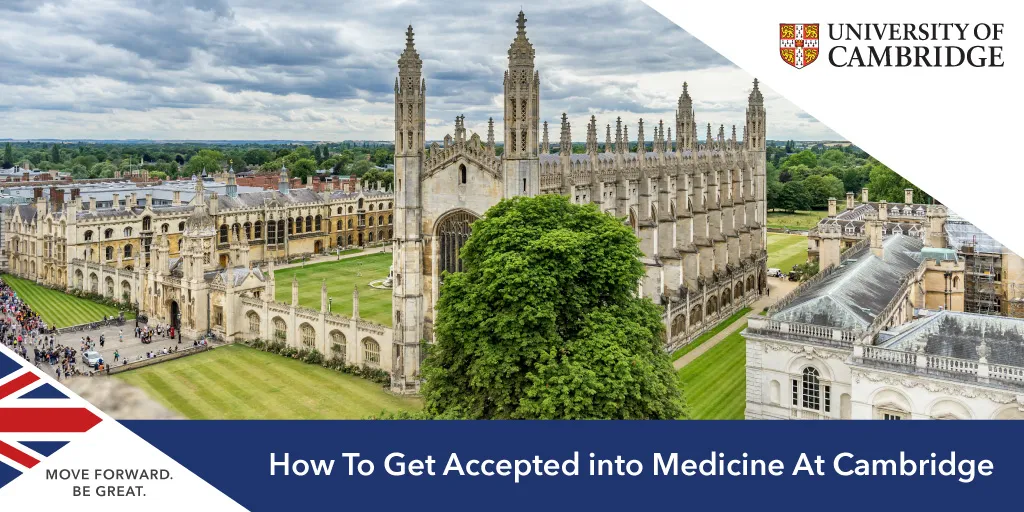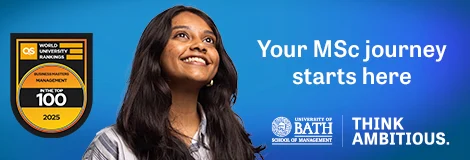Are you dreaming of studying medicine at the University of Cambridge?
As one of the world's top-ranked medicine programmes, Cambridge sets high standards for its international applicants, and in this comprehensive guide, we'll break down the application process step by step, offering valuable insights and advice to help you on your journey to get accepted into medicine at Cambridge.

How To Get Accepted into Medicine At Cambridge
- Achieve Outstanding Grades
Your academic performance is the cornerstone of your application. Medicine at Cambridge is highly competitive, and the university seeks candidates with exceptional qualifications.
Currently, the minimum required grades are AAA in A-levels or 40-42 points at IB (with a 776 spread across your higher level IB subjects). However, aim for predicted grades of AAA* or the IB equivalent (around 42-44 points with a 777 spread) to stand out.
Cambridge also requires chemistry and mathematics, physics, or biology at A-level. Choosing your A-level subjects wisely is crucial, as your choices can significantly impact your chances of acceptance.
- Choose Your A-level Subjects Strategically
Cambridge strongly favours applicants with a background in science and mathematics. In recent admissions rounds, 95% of successful medicine applicants were offered three or more science/mathematics A-levels. Of those who offered only two science/mathematics A-levels, just 3% secured a place. Therefore, aim to take at least three science or math subjects, with four being more favourable.
- Research Colleges
Cambridge is a collegiate university comprising 31 distinct colleges, each with its own unique characteristics. When applying, you can choose a specific college or opt for an open application, where the university assigns you to a college. Take time to explore the colleges, considering factors like size, atmosphere, and facilities. The best way to make an informed choice is to visit in person during the open days in July, where you can interact with students and faculty.
- Navigate UCAS
The University and Colleges Admissions Service (UCAS) is the platform through which you submit your application to Cambridge. You must ensure that you meet the October deadline (earlier if applying from outside the UK), and your application should include predicted grades and a compelling personal statement highlighting your passion for medicine.
Gain relevant experience by shadowing doctors, volunteering with medical charities, or attending medical conferences. Research a niche area within the field to discuss during your interview. An SI-UK consultant can assist with your application in full.
- Take the BMAT (BioMedical Admissions Test)
The BioMedical Admissions Test (BMAT) assesses your thinking skills, scientific knowledge, and writing abilities. Register in advance through your school's exam officer and take the BMAT at an accredited testing centre (often within your school if you're in the UK). Section 1 tests your thinking skills, section 2 assesses scientific knowledge and applications, and section 3 requires writing a well-structured response to a prompt. Preparation is essential, so practice and familiarise yourself with the test format.
- Prepare for the Interview
If you receive an interview invitation, it's a significant step in the application process. Cambridge interviews typically take place in December, with notifications by late November. Interviews are usually held at your preferred college, or you'll be assigned one if you opt for an open application.
Don't be intimidated by myths of eccentric professors and strange questions. Interviews are meant to evaluate your ability to handle complex concepts and adapt to challenging ideas. Prepare by practising critical thinking, discussing medical topics, and staying calm under pressure.
- Stay Informed About Language Tests
If English is not your first language, be aware of any additional language tests required before or during the interview process. Refer to the Cambridge website for detailed information on these tests.
- Be Patient and Await Your Offer
By early January, you'll find out if you've received an offer from Cambridge. If you're successful, you must accept the offer through UCAS. Be prepared for conditional offers based on your final exam results.
Sometimes, you may be pooled, meaning your preferred college is oversubscribed. Pooled students can be reassigned to another college or undergo additional interviews. By the end of January, all applicants should know their Cambridge fate.
Study Medicine at Cambridge University
Getting accepted into medicine at Cambridge is a challenging but rewarding journey. Focus on maintaining excellent grades, selecting the right A-level subjects, and preparing thoroughly for the BMAT and interviews. Research colleges, craft a standout personal statement, and gain practical experience in the medical field.
Dedication and determination can increase your chances of securing a spot in one of the world's most prestigious medicine courses. Good luck on your path to becoming a Cambridge medical student!
Cambridge Medicine FAQ
How do I get into medicine at Cambridge?
Securing a place in the medicine degree at the University of Cambridge is a multi-step process. It starts with achieving top grades in subjects like chemistry, biology, mathematics, and physics at the A-level or equivalent. Ensuring you have the right A-level subjects, with chemistry as a requirement, is crucial. You should also prepare for and take the BioMedical Admissions Test (BMAT) to assess your skills.
Crafting a strong UCAS application with a passion-filled personal statement, gaining practical work experience, and preparing for the Cambridge interview is essential. If English isn't your first language, be aware of language test requirements. Finally, in early January, you'll learn if you've received an offer, with the need to meet conditional requirements.
Is it hard to study medicine at Cambridge?
Studying medicine at Cambridge is undoubtedly challenging. It's a highly competitive degree that requires dedication and hard work. You'll face rigorous academic and clinical components and high expectations. However, many students find the experience to be immensely rewarding, as it offers a solid foundation for a career in medicine.
Does Cambridge offer scholarships for medicine?
Yes, the University of Cambridge provides various scholarships and financial support for international students. Scholarships can be based on academic excellence, financial need, or other criteria. Specific scholarships for medicine students may be available, and it's recommended to contact SI-UK about your application.
How do I get a full scholarship to Cambridge?
Securing a full scholarship to Cambridge is challenging but possible. Here's a simple plan: Be a top student and meet course requirements—research specific scholarships for your course and external opportunities. Create a strong application highlighting grades, activities, and contributions you can make. Seek guidance from Cambridge's admissions and financial aid experts. Stay on top of application deadlines and requirements. Scholarships at Cambridge are competitive, so excel academically, plan ahead, and persistently pursue opportunities that match your qualifications and goals to increase your chances of success.
Which college is easiest to get into at Cambridge?
Cambridge colleges have varying acceptance rates, and choosing one that aligns with your preferences is essential. There isn't a specific "easiest" college to get into, as admission rates can change from year to year. Instead, focus on finding a college that suits your academic and social needs, as this will contribute to your overall experience.






 My consultant was very helpful and motivating. She helped me every step of the way, even when the deadline was so close. I feel I could not have done it without her. I'd highly recommend this service to any and all of my many friends interested.
My consultant was very helpful and motivating. She helped me every step of the way, even when the deadline was so close. I feel I could not have done it without her. I'd highly recommend this service to any and all of my many friends interested. 









